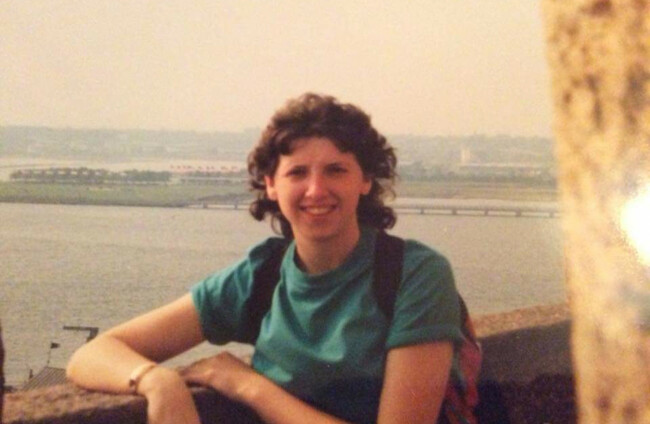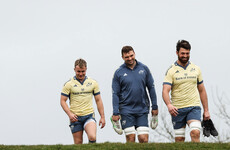EVERY TIME Sue Ronan drives down the Naas Road, she always thinks of Ann McLoughlin.
The future Ireland manager made her international debut in 1988 but was invited along to the national team’s training a year prior.
“I hadn’t even got a clue whether there was a women’s team and what they were doing, even though I was in my early 20s,” she tells The42. “It’s a terrible thing to say but that’s just the way it was.”
Ronan first watched the team play in Dalymount Park against the Netherlands on 29 November 1987.
Another future Ireland manager, Vera Pauw, lined out that day for the visitors, who won 1-0 and would ultimately qualify from the group along with the Swedes.
“We put up a really good performance because Holland would have been one of the top teams and in those days the top teams were just so far ahead it was unreal,” Ronan recalls.
“Ann stood out for me on the Irish team, playing on the wing. She just seemed to be gliding by players, that was her style. It was like the old-fashioned winger and I tried to think of someone like that in the men’s game that it would remind you of, maybe Tony Galvin or Steve Heighway.
“I just thought she was brilliant. And that was my first introduction to her.”
- For more great storytelling and analysis from our award-winning journalists, join the club at The42 Membership today. Click here to find out more >
Last April, Ireland’s 1-1 World Cup qualification draw against Sweden, who were ranked second in the world at the time, was rightly hailed as one of the side’s best results ever, however it was not unprecedented. 34 years earlier, just as Katie McCabe would later do, McLoughlin scored the goal to secure an impressive point for the Irish side at home against a Swedish team who had been champions of Europe four years previously.
Ronan gradually got to know this talented rising star.
“She would have been around the same age as me and I was coming into the squad as a young one. I was looking up to everyone because it was new to me. I was nervous but she was a really friendly girl.
“My first game was away to Sweden [after the home match] and we lost 4-0. Little things stand out. That night after the game, we had a bit of a sing-song.
“Every time I pass the road I always think of her and every time I hear this particular song, ‘Nights in White Satin,’ I think of her.”
The 1967 song by The Moody Blues seems an unusual choice for a post-match sing-song, but its fatalistic lyrics feel eerily prescient in the context of what was to come:
Breathe deep the gathering gloom
Watch lights fade from every room
Molly Ryan remembers playing alongside McLoughlin at Rathfarnham, widely regarded as the best team in Ireland during that period.
“She was one of the best strikers in the country, and her personality, her smile was infectious. She changed the dressing room for us. She brought an awful lot of positivity with her attitude.
“She helped me settle in immediately — I would have come from another team — because we know each other, and she knew what it was like to be the newbie.
“And Rathfarnham could be very intimidating because almost every player was either an international at the time or was an international before.”
“She was just funny,” adds Noeleen McMahon. “We’d go to The Bottle Tower [restaurant] after the games. And we’d have an old sing-song and she’d always join in.
“When we were on the Irish team for the Spanish game, I don’t know what happened to Ann that she didn’t play, but I went down a pothole.
“So I lost my position. And she actually rang me to go for a pint. And I said to her, I haven’t a leg to stand on, I’m on crutches.
“She was saying ‘you’ll be grand, you can walk on one leg, you can play football’. Do you know? She was just funny. Great company. Great to sit with. Great to play with. A fantastic footballer.
“Her boots had holes in the toes of them. I’d be coming out to the game and my boots would be gleaming. I would say to her: ‘Do you not clean your boots, Loughie? She said: ‘Why would I when I’d be dirtying them again?’”
McMahon continues: “We’d be going out to a game, we were playing in a cup final or something, I’d be saying: ‘Jaysus I’m shaking, I’m nervous.’ And she’d be saying: ‘Just relax and play your game. You’re only as good as them, if not better.’ She was full of confidence.
“Defenders didn’t like playing against her because she was a nightmare. She’d beat you, then she’d have a bit of banter with you, she’d come back and beat you again. Do you know what I mean? A cheeky player.”
“Ann would be over talking to the four lads with the farmers’ caps on them [on the sidelines],” adds Ryan
“Even the opposition loved her. We could be playing a regular team, or a regular league game on a Wednesday night and you could have 60 people on the sideline, and half of them would be there to see her.
“She was a natural player and naturally fit as well. I don’t know how, because if anyone could dodge training, she could.”
Marian Leahy was the Irish captain and widely regarded as a leader on and off the field. Her house in Clondalkin was available to any footballer needing a place to stay. Originally from Manor Kilbride, Blessington, McLoughlin was living with Leahy and another Irish international, Martina Colville, when tragedy struck.
“[Marian] was like the senior figure for them,” says Ryan. “And it was an open house for the girls — if it made it easier for them to have a football life, if they had jobs [in Dublin], to stay with Marian.”
Perhaps McLoughlin’s three biggest passions in life were football, horse racing and people, and they were all interconnected on 4 January 1992 — the day of her tragic passing.
“On the day she died, she was after coming back from Punchestown with her father,” recalls Leahy. “She arrived back at [her parents'] home in Manor Kilbride and then she was coming up to me.
“There was a group of us, about five or six that became very close because we lived and socialised together for quite some time.
“She was driving her motorbike. She was coming up by the Green Isle Hotel. I’m in Clondalkin in the Dutch village. So she was almost here when the accident happened at five o’clock in the day.”
McLoughlin died shortly after being struck by the car of an individual who was found to be over the drink-driving limit, and who was subsequently sentenced to three years, with three-quarters of that sentence suspended.
Her death, at the age of 23, rocked the women’s football community in Ireland.
“It’s 30 years now,” says Ryan. “We’ve never been the same since.
“There was one time for two years, we weren’t beaten in Rathfarnham. We were in every final, every year. But we could still have a laugh
“When Ann passed away, that team, it was never the same.”
“It just crushed the team,” agrees McMahon.
“I didn’t play a lot after that. Two or three of the girls left — they said they would never play again.
“The first training session we had, when we were up in Nutgrove, there was a row of bushes and we often went behind it to go to the toilets when the dressing room wasn’t open. We had started to do our warm-up, and I just stood. Two of the girls stood with me and asked: ‘What’s wrong with you, Noeleen?’ And I said I’m just expecting her to jump out and say: ‘I’m only messing.’
“It was like losing a sibling. Many of the girls had never gone through grief before. I cried for weeks. I’d be going to work and I’d just cry. And I couldn’t explain it. I’d be sobbing. I said, I just can’t believe this.”
For McMahon, it was a second major loss in her life within a short space of time.
“I had lost my father a year before that and it crushed me but when Ann died, it just broke me.
“My dad was a League of Ireland referee and a referee inspector, and he died suddenly.
“And it was Ann who told me when my dad passed away after the Ireland-Italy game, where Italy knocked us out of the World Cup.
“It was Ann who said that the phone call was for me. She told the girls it was a bad call for me. And they were very supportive when my father died.”
***
Few people were closer to McLoughlin than her international teammate Patricia Hughes.
“You’re talking about Ann’s best friend from an early age,” says Ryan. “Trish Hughes and Ann were inseparable.
“They went around like two peas in a pod. But it wasn’t just that, it was the football aspect of it as well as the friendship, they were both equal.
“But they were equal divils. Trish would be more serious on the pitch, and five minutes later, you’d hear her laughing, because Ann would say something to her.”
Now, Patricia Hughes is based in Charlotte, North Carolina. Having gone away on a soccer scholarship in 1989, sacrificing her international career in the process, she remains in the football industry to this day, working as a director for the National Office for United Soccer Coaches.
“We were part of that young group growing up together in the game, and we found ourselves playing at a level with a lot of older, mature players, who really took us in and created safe spaces for us and kept us protected,” she recalls.
“There was a talent level there, that kind of immersed us into this group of really talented women leaders who were at the core of the foundation of the game, and I just remember the commitment and the level of training and the engagement as friends.
“And when you’re young at that age, and you have a best friend, and they’re taken so quickly, it just kind of rocks you to the core because she was such a pivotal figure in the game.”
A devastated Hughes ultimately made the difficult decision not to attend McLoughlin’s funeral.
“My mother actually told me, if I come home for the funeral, chances are, I won’t go back to America, because I wouldn’t have, it would have been so emotionally [draining].
“So I stayed in America. And I know it just fractured the group because it was such a loss.
“I’m sure it set people back, where everybody just stepped back into their own quiet space trying to cope with the loss. And I think not so much even with her death, but the manner in which she died as well.
“For someone that you love so much to die in those tragic circumstances, I think you go into a place of reflection, where you really start to question everything.”
Hughes adds that she has been in touch with the FAI in the hopes that they will belatedly honour her legacy, 30 years on from her passing.
“Ann was such a centrepiece for women’s football, the young generation of players that were coming through.
“And I think one of the hardest things is that, from what I understand, there was never really anything that was done by the FAI to honour her legacy or to celebrate her because she was a player that was ahead of her time.
”And so isn’t it high time that they celebrate this generation of players? And within that, celebrate Ann’s legacy.”
Hughes has a wealth of positive memories when it comes to McLoughlin, even if they are tinged with a retrospective sense of melancholy.
“I remember arriving for a game and Fran Rooney was coach — you’re being focused and serious. But we were always acting the fool. Not in a disrespectful way. But people gave Ann that space because that’s how she was. But when it came game time, Ann was as committed and serious as anyone.
“I remember Ann playing and I swear to God, it was against Holland, my memory may be off because I’m old.
“And Ann just gritting it out and scoring a goal, somehow the ball came flying across the box, and Ann put the damn ball in the back of the net with her hip. And it was so classic Ann, Ann didn’t give a fuck. A goal was a goal and if you put it in with your arse, it was to be celebrated.
“But then that became a great story later in the pub, how you were able to put a ball in the back of the net with your arse and you don’t care and you celebrate like you scored the best volley of your life.”
***
Ann McLoughlin may no longer be alive but her life and legacy have been and continue to be celebrated.
“I was in the army and I’ve seen huge funerals,” says Ryan. “But her funeral was the biggest. We had teams coming up from Limerick, Cork, from all over the country.
“Even afterwards, for a couple of years, you would get the players to come out and attend the anniversary mass — we’d all sit around and talk about the stories of the time,” adds Leahy.
In more recent years, a number of players from that generation have reconnected, as Ryan explains: “Facebook has brought all of my teammates back together after 30 years.
“For Ann’s anniversary every year, we put up all our old photographs. And we do plan on meeting at some stage before the winter comes in so that everyone can get together and just have a laugh again.”
Ryan continues: “Myself and Marian would still go to the memorial masses. In the last six years, I haven’t, because my mum passed [around the same time].
“But this year, [I arranged] my mother’s mass for another day. I missed it because it’s nice to see a familiar face, someone that will bring back those memories.”
“We often go out to the family for the anniversary masses and they love seeing people,” says McMahon. “And it’s so hard talking about her to them. But when we see them, we talk like she’s still alive because to us the memory is still alive.
“They love you to talk about her. They love that you don’t forget her. And sometimes you can still see the pain in their face when they’re talking. But we always talk about funny things, funny things that she used to do.”
“I went back recently — Molly took me out to the grave and I reconnected with her parents,” says Hughes.
“What helped the McLoughlins was the amazing support from the soccer community that was led by Marian and Molly, and all these women that still go out and visit with McLoughlins every year. And even for me, going back to see them brought me back to a happy time.
“When people pass, they fade in your memory, but there are those that leave a mark in your heart that never goes away, and you’re immediately brought back to that day and the hurt that it caused, and the pain.
“The pain is different now because you look back and you think how much you absolutely loved that person. Because 30 years later, not only are we still talking about her, even more so now, we understand the enormity of the loss with her passing, certainly as a footballer, but as a friend and a person. And then the loss of that family.
“I mean, her personality was enormous. And she was the centre of that family in every way, not only in terms of as a daughter but in terms of their pride and energy. Because Ann was such a connector of people. She came with a posse of people that were always hanging around her and her parents created this open and welcoming environment for her and her gang.”
“30 years later, we talk about her every day,” says Ryan. “Loughie left a hole in everybody’s life.”
And for Ryan, she will always remember McLoughlin as someone with a pure love of sport and life, which epitomised the prevailing attitude of her peers.
“When we catch up with each other, we always reminisce and it doesn’t do anything, only put a smile on our faces. That’s what it’s all about. If you look at a player on the pitch, and they look like they’re miserable, there’s something wrong somewhere.
“It’s something that I think: we were never miserable. Even if we lost, we were still happy to get this final or play this [game]. You do it because you love it. If you can get money, that’s brilliant. But it shouldn’t be all about money. It should be about what you’re getting out of it.”
It is Hughes, however, to whom the last word belongs.
“In the moment, you’re just in this fog of: ‘Oh, my God.’ And I think you’re forced to reflect. You look back on the relationship and the memories. And I can say I loved Ann McLoughlin to my core.
“And there are certain songs I hear on the radio that take me back to those road trips down to Limerick to training.
“Ann’s memory has never left me. And while I don’t see her family every year as some of the others do, she’s part of who I was, as a youngster.
“When I look back at key points in our life, my childhood, if you ask who were those key figures in life, Ann McLoughlin was one, along with Marian and the other girls because football was our life. It was all we wanted to do. And not only did football give us that opportunity to play and compete, but it also gave us a lifelong bucket of memories and friendships that have never, ever gone away for us.
“I’m a mother now, I have a seven-year-old son and I can’t imagine the pain and suffering that the McLoughlins went through. I lost a brother myself in a car accident a few years back, and I think of his passing and I think of the loss. And I look at the impact on my own mother. And then I see the impact when I go back to Ann’s parents, the fact that we care enough about Ann to want to visit with her parents shows that football gave them a coping strategy and the connection to Ann’s friends.
“And I think that when I look back at it, it was not only the loss of a friend, it was a defining moment for all of us as youngsters.
“And I miss my friend every day. And I think if she was around today, we’d all still be connected, being mad, doing stupid stuff like we always did.
“What was funny was we were playing with senior women. But sure, we were about as dumb as a box of rocks.
“But we were so insulated and protected by all those women who were above us, it was a really special opportunity in time that when I look back now, I’ve nothing but amazing memories.
“It sounds kind of cliche-ish, but our life is precious, and you never know, in an instant, what can change. To this day, Ann’s death is still profoundly sad. And she’s still loved at the same level she was back then as she is today.”
For more great storytelling and analysis from our award-winning journalists, join the club at The42 Membership today. Click here to find out more >



















Glad to here it , don’t want him at Utd
#hear
I concur! Not a united player, where would he even play? Kagawa and Rooney play in the same position and this silly haircut joker wouldn’t displace either.
Felaini is garbage. He doesnt deserve to be in a top 4 team. If fraud boy goes for this overgrown waste I hope man u fans be calling for his head. He is like a poor version of Niall Quinn.
Looking forward to the junior cert results?
Fellaini would walk onto to the Man Utd midfield. The Utd central midfield is absolutely woeful, definitely the weakest of the top 4. Think Utd fans have forgotten 1st game of the season last year when Fellaini destroyed ye.
Another one that Wenger missed out on
Anybody who says he’s over-rated just looks at the traditional top teams and hasn’t a clue about the mid and lower tabled teams.. Ye probably couldn’t even name three other Everton players without looking on the Internet.. #clueless
Man United don’t need average players
Are Utd selling half their team so?
You don’t break every record and win so many trophies with an average team,I’m guessing you’re a jealous scouse fan. Keep the jealousy coming we love it!
Rooney, RVP and Vidic name me another top class player at utd?
Brutal anyway
If he can make it into the Belgian midfield with the options they have, he’s far from brutal
Overated big time
Quality Player.